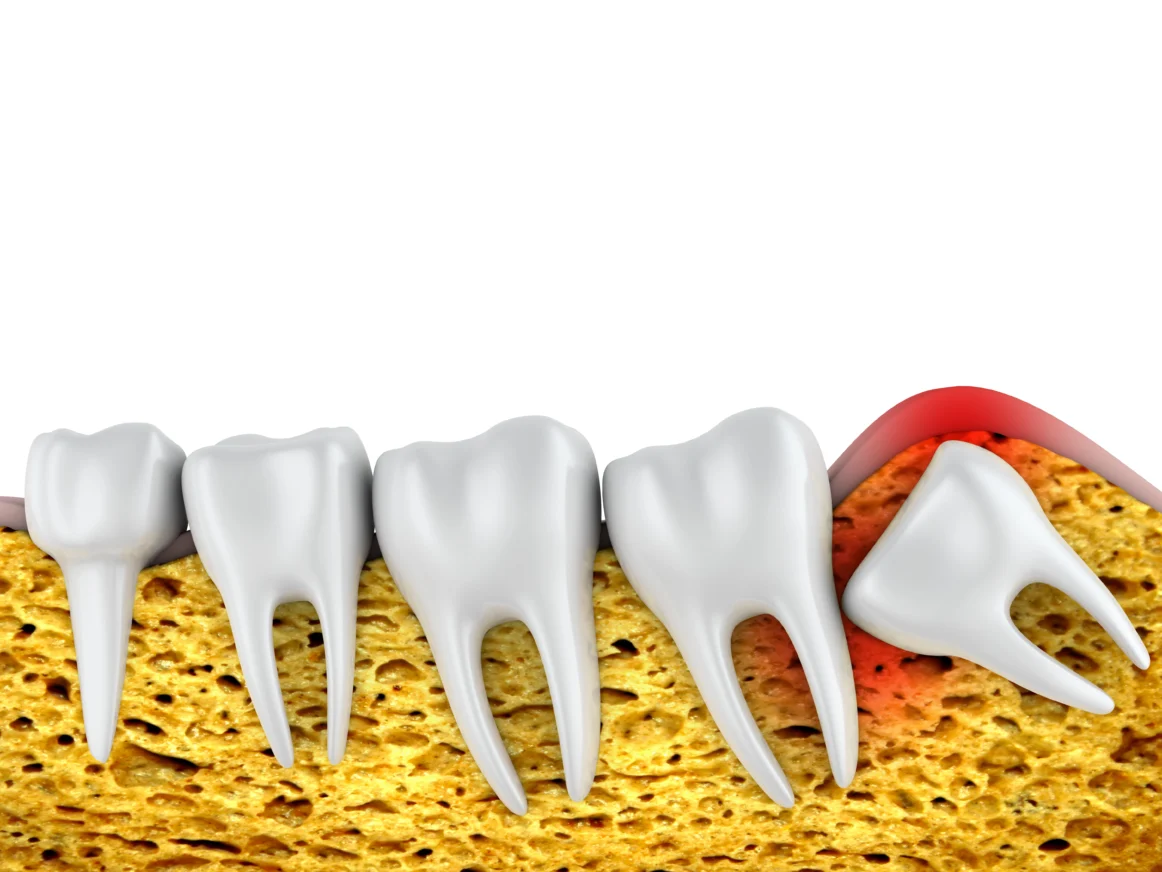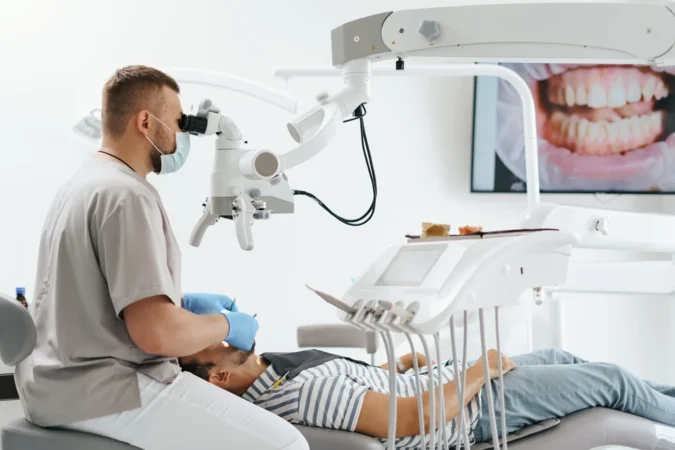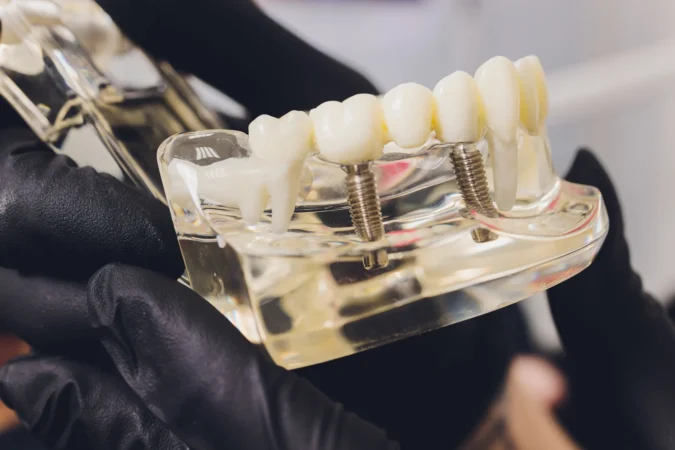Lower wisdom-tooth pain can happen at any age, but not everyone needs a tooth removed. Wisdom teeth are your third molars—the last to emerge—and for many people they fit in and cause no trouble. For others, a lack of space or a tooth that only partly erupts can lead to soreness, swelling, or occasional infection. The good news: these problems are very treatable, and serious complications are uncommon when you’re seen promptly.
Instead of worrying about the worst-case scenario, it helps to understand what causes wisdom-tooth pain, what symptoms to watch for, and which treatment options are available. Once you know that, you can make an informed decision about whether you need extraction and where to have it done.
Why Does Lower Wisdom-Tooth Pain Happen?
There are several reasons why lower wisdom teeth pain can happen:
- Crowding and impaction: The bottom wisdom tooth does not have enough space to come in properly and may be nudging against the following molars and applying pressure.
- Food and bacterial accumulation: Because they are located in the back, it is harder to clean the wisdom teeth. Food and bacteria pile up and result in irritation or infection.
- Gum disease and decay: Higher brush and floss difficulty gum disease and decay are more likely.
- Infection: Partly impacted wisdom teeth, according to the American Dental Association (ADA), offer a channel through which bacteria can pass down the gums and infect them. This “may also cause pain, swelling and stiffness in your jaw”1. Pain upon opening the mouth, foul breath, or pain that spreads out from the tooth is most often due to infection of the lower wisdom tooth. The Mayo Clinic goes on to state that symptoms of an infected impacted wisdom tooth include swelling of the jaw and having a “hard time opening your mouth”2.
Symptoms of an Infected Lower Wisdom Tooth
Early signs are prevented by detection. Watch for:
- Infected wisdom tooth jaw swelling.
- Inflammation that will not open the mouth.
- Pain in ear, throat, or head due to toothache.
- Bacterial infection pus or halitosis.
- Fever and fatigue, maybe suggesting that the infection is progressing.
If you notice these symptoms, schedule an appointment with your dentist or oral surgeon as soon as possible. If the swelling or pain becomes severe, seek urgent care at a dental emergency clinic or hospital.
Alternatives in Treating Wisdom Tooth Pain
Home Remedy for Relief of Pain Temporarily
To feel pain wait for a dental visit, try:
- Warm saltwater rinses to dislodge food particles.
- Cold compresses against the jaw to reduce swelling.
These are temporary relief methods but cannot eliminate infection or impaction.
Professional Treatment
- Simple extraction: If the tooth is half erupted, extraction is easy.
- Surgical removal: Oral surgeons may need to cut through a small flap of bone and gum when removing impacted wisdom teeth. It is often given under local or general anaesthetic to suppress pain.
- Oral hygiene support: Professional cleaning and guidance prevent re-infection.
Neglecting an infected wisdom tooth will result in severe medical complications, including the transmission of bacteria beyond the mouth.
Am I a Candidate for Wisdom Tooth Removal?
You may be a candidate for wisdom tooth extraction if you experience:
- Typically less pain in your wisdom teeth.
- Oftentimes recurring infection or inflammation in your gums.
- Trouble opening your mouth or trouble chewing.
- Cavities in adjacent teeth because of pressure.
Surgical patients with medical conditions such as uncontrolled diabetes or blood disorders will require special preoperative assessment. Always visit an experienced oral surgeon to assess your case.
Cost in the US & UK & What Affects It
The cost of removing an impacted lower wisdom tooth varies significantly depending on the country, your health insurance or public health coverage, and how complex the case is.
- In the United States, costs range roughly from $1,200 to $4,175 for full wisdom tooth removal. Those with good dental insurance may have much of this covered.
- In the UK under the NHS, wisdom tooth extraction generally falls under Band 2, which costs around £75.30 for necessary extractions.
Privately in the UK the price per wisdom tooth is usually between £200–£600, with more expensive cases if surgery, sedation, or hospital-based treatment is required.
A Smarter Approach to Dental Tourism in Turkey
Dental tourism is more than just saving money—it’s about combining advanced care with patient comfort. At clinics like DentSpa Istanbul, which was recognized as Europe’s Best Dental Clinic in 2024, patients can benefit from world-class dentistry at costs up to 70% lower than in the US or UK.
One of the most valuable opportunities is the chance to book a free video consultation. Patients can get advice on their wisdom tooth concerns while also exploring other treatments such as:
- Dental bridges
- Hollywood smile design
- Root canal therapy
- Full-mouth solutions like All-on-4 implants
With internationally trained dentists, advanced technology, and complete care packages (airport transfer, hotel stay, multilingual coordinators), DentSpa ensures patient satisfaction and a stress-free journey from consultation to recovery.
References:
- American Dental Association. (2025). Wisdom teeth. MouthHealthy. Retrieved September 12, 2025, from https://www.ada.org/sitecore/content/ADA-Organization/ADA/MouthHealthy/home/all-topics-a-z/wisdom-teeth.
- Mayo Clinic. (2024). Impacted wisdom teeth: Symptoms & causes. Mayo Foundation for Medical Education and Research. Retrieved September 12, 2025, from https://www.mayoclinic.org/diseases-conditions/wisdom-teeth/symptoms-causes/syc-20373808.
- How Much Does Wisdom Teeth Removal Cost? — CareCredit
https://www.carecredit.com/well-u/health-wellness/wisdom-teeth-removal/. - How much NHS dental treatment costs — NHS (UK)
https://www.nhs.uk/nhs-services/dentists/how-much-nhs-dental-treatment-costs/.
Frequently asked questions
How do costs compare between local clinics and treatment abroad?
Fees vary with case complexity and anesthesia. Those who are comparing Austin oral surgery and out-of-country care typically choose offices that provide an up-front estimate, travel coordination, and follow-up coordination. Ask for a written quotation of overall cost, anesthesia, and follow-ups prior to making your decision.
If I just wait to have an infected wisdom tooth removed?
Infections can spread to nearby teeth and jaw tissues and, in rare cases, contribute to systemic issues if ignored. The ADA and oral-surgery literature advise timely treatment to prevent complications. If you’re postponing for cost or travel, ask about interim steps (e.g., rinse protocol, review timeline) to reduce risk.
Can home treatments replace surgery?
No. OTC medication and warm saltwater soothe symptoms but will not fix impaction or eliminate infected tissue. With recurrent infection, definitive treatment is removal and debridement of the site. Discuss with your dentist how long you may safely stay home before you must be evaluated in person.
How soon after surgical extraction can I recover?
Most patients recover well within 5–7 days; swelling can last up to two weeks depending on the extent of the impaction. Soft diet, oral hygiene, and night elevation facilitate recovery. If you have an active sporting or working lifestyle, ask about safe return.
Does extraction of a wisdom tooth hurt?
You feel at ease with local or general anesthesia when you undergo extraction or surgical extraction. There is minimal soreness and swelling for a few days after the extraction. Pain is controlled with pain medication your physician recommends or over-the-counter pain medication, ice packs, and rest. Consult your surgeon about what type of anesthesia is best for your situation and lifestyle.
How do I know if I have an infected wisdom tooth?
Watch for toothache, swelling, bad breath, pus, or being unable to open your mouth. Fever may occur at later stages. The ADA suggests an immediate visit for such symptoms as infection can progress if left untreated1. If the swelling continues after 24–48 hours, consult your oral surgeon whether imaging is needed.

















 70%
70% 

